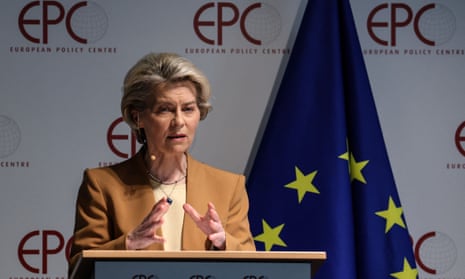The European Commission president, Ursula von der Leyen, has called on Europe to reassess its diplomatic and economic relations with China before a visit to Beijing next week with the French president, Emmanuel Macron.
Europe needed to have “a clear-eyed picture on what the risks are”, she said in a wide-ranging speech in Brussels, noting that EU-China relations had become “more distant and more difficult” in recent years as China moved into “a new era of security and control” and ramped up “policies of disinformation and economic and trade coercion”.
Von der Leyen and Macron are expected to meet the Chinese president, Xi Jinping, in Beijing on Wednesday, after the French president invited her to join a trip in order to present a united European front.
In her speech to the European Policy Centre and the Mercator Institute for China Studies, which she noted had been put on Beijing’s sanctions list in 2021, Von der Leyen said the Chinese Communist party’s goals were “systemic change of the international order with China at its centre”, promoting an alternative vision “where individual rights are subordinated to national sovereignty” and “security and economy take prominence over political and civil rights”.
She also described China’s “grave human rights violations” in Xinjiang a cause for great concern, adding that the issue of human rights would be “another test for how – and how much – we can cooperate with China”.
Western countries and the UN have accused China of mass repression of the Uyghurs in Xinjiang, where it is thought a million or possibly more have been sent to indoctrination camps, where inmates are said to be subjected to mass surveillance, torture, sexual assault and forced sterilisation.
But to preserve Europe’s economic interests – €1.9bn (£1.68bn) a day in goods trade – Von der Leyen said it was not in the continent’s interest to decouple from China. “Our relations are not black or white – and our response cannot be either. This is why we need to focus on de-risking – not de-coupling.”
In 2019 the EU described China as simultaneously a “partner”, “economic competitor” and “systemic rival”. Officials say that assessment remains valid. Von der Leyen, however, appeared to put more stress on the “systemic rival” part of the analysis, although she praised China’s role in recent international agreements to tackle the nature and climate crises.
Nevertheless she effectively laid to rest hopes – held by some in Brussels and Berlin – of reviving a stalled investment treaty with Beijing. After seven years of marathon talks, the comprehensive agreement on investment between the EU and China was put on ice in 2021, after the two sides fell out over Beijing’s treatment of the Uyghurs. The agreement, which had been championed by the former German chancellor Angela Merkel, would have meant Beijing loosening some of its stringent rules on foreign companies, in a boost for European firms.
Von der Leyen said the world had changed since the deal had been negotiated. “We need to reassess CAI in light of our wider China strategy,” she said, adding that there were areas where “trade and investment poses risks to our economic and national security”.
The commission was considering imposing restrictions on European hi-tech companies investing in China, if there was a risk that European capital and expertise could aid China’s military, affect human rights or European security. Such a “defensive tool”, she said, would affect sectors such as microelectronics, quantum computing, robotics, AI and biotech.
She urged EU member states, which have traditionally have been divided on China, to be bolder and faster in using existing investment and export controls and more assertive in enforcement.
In an uncontroversial note for the EU27, she said the way in which Beijing interacted with Vladimir Putin’s war on Ukraine would be “a determining factor for EU-China relations”, noting Xi’s state visit to Moscow last week, which, she said, revealed he was maintaining his “no-limits friendship” with Russia. “It is clear from the visit that China sees Putin’s weakness as a way to increase its leverage over Russia,” she added.
Referring to China’s 12-point position paper on Ukraine, Von der Leyen repeated Europe’s doubts about the so-called peace plan. Any plan that consolidated Russian annexations was “simply not a viable plan”, she said.
